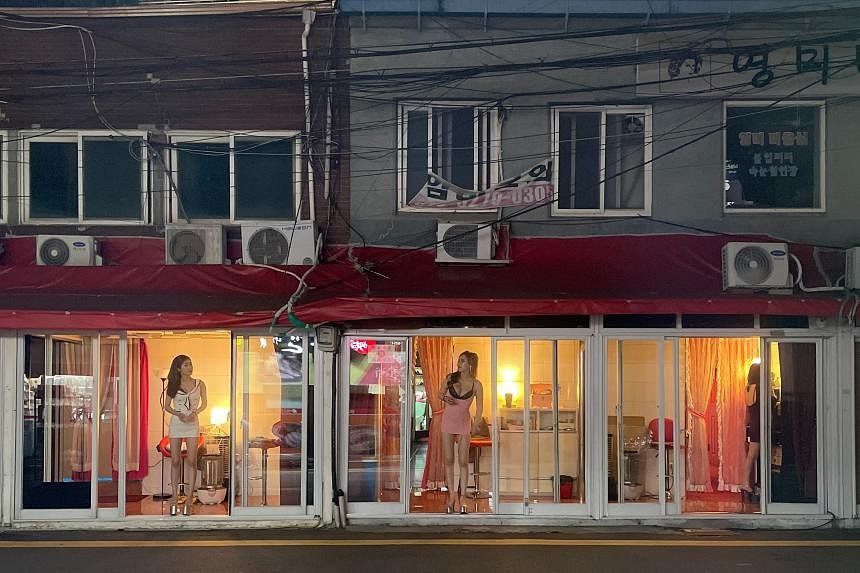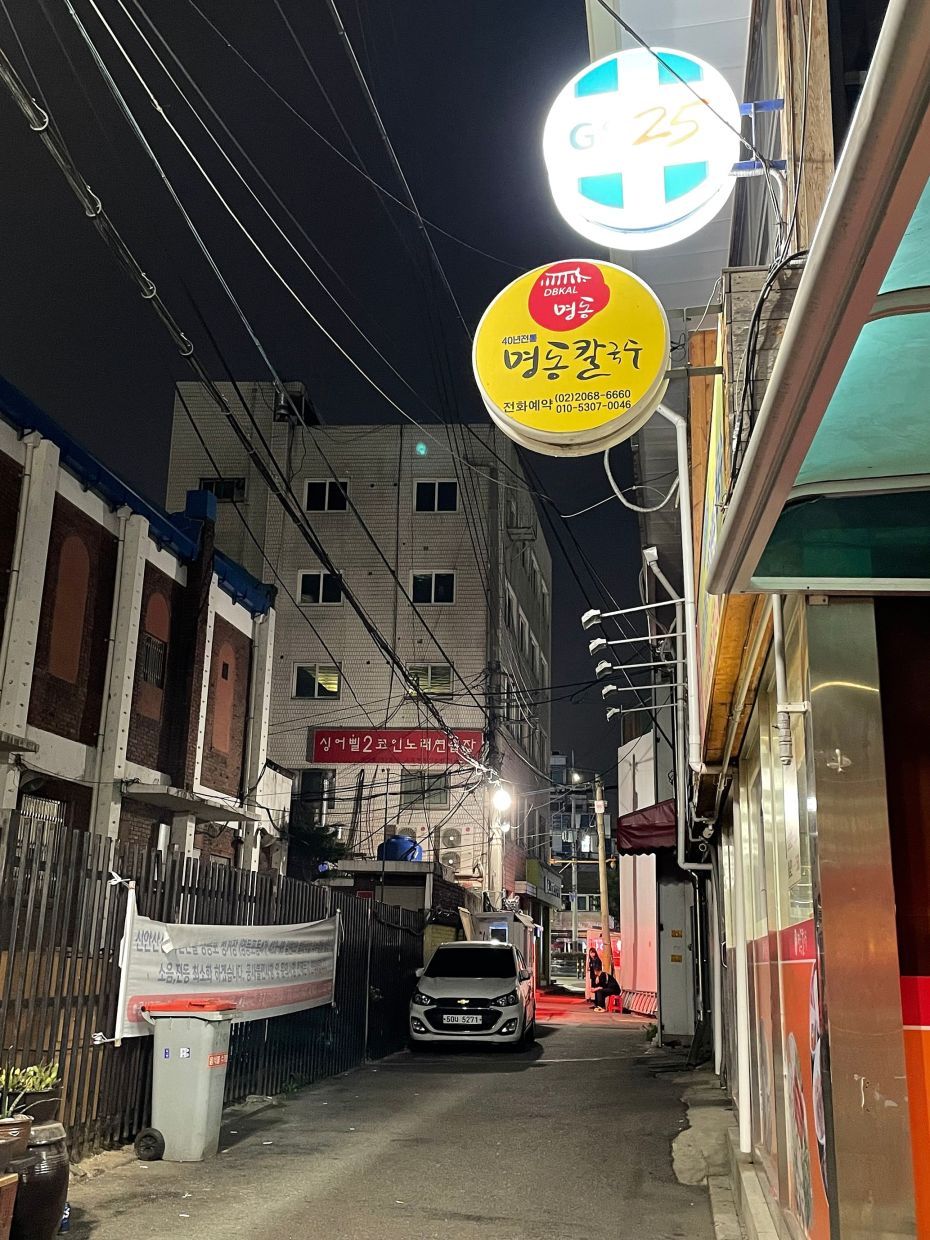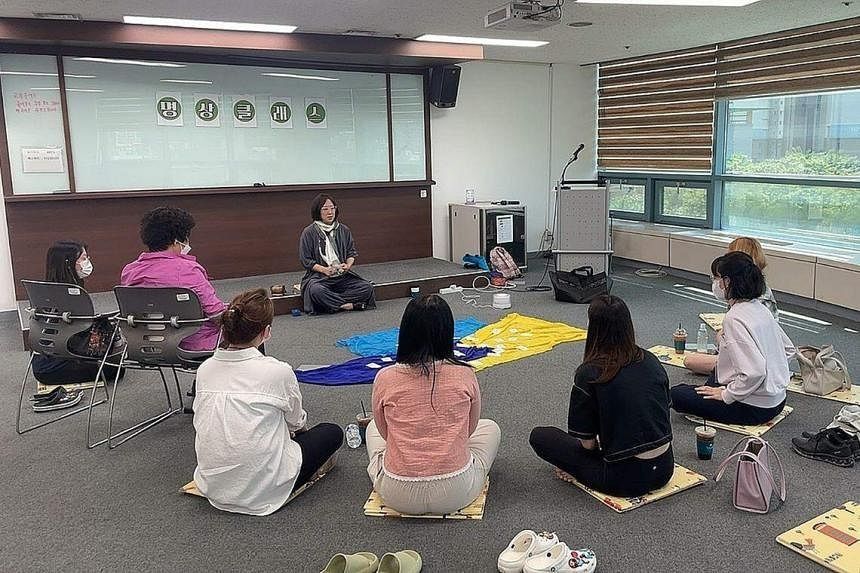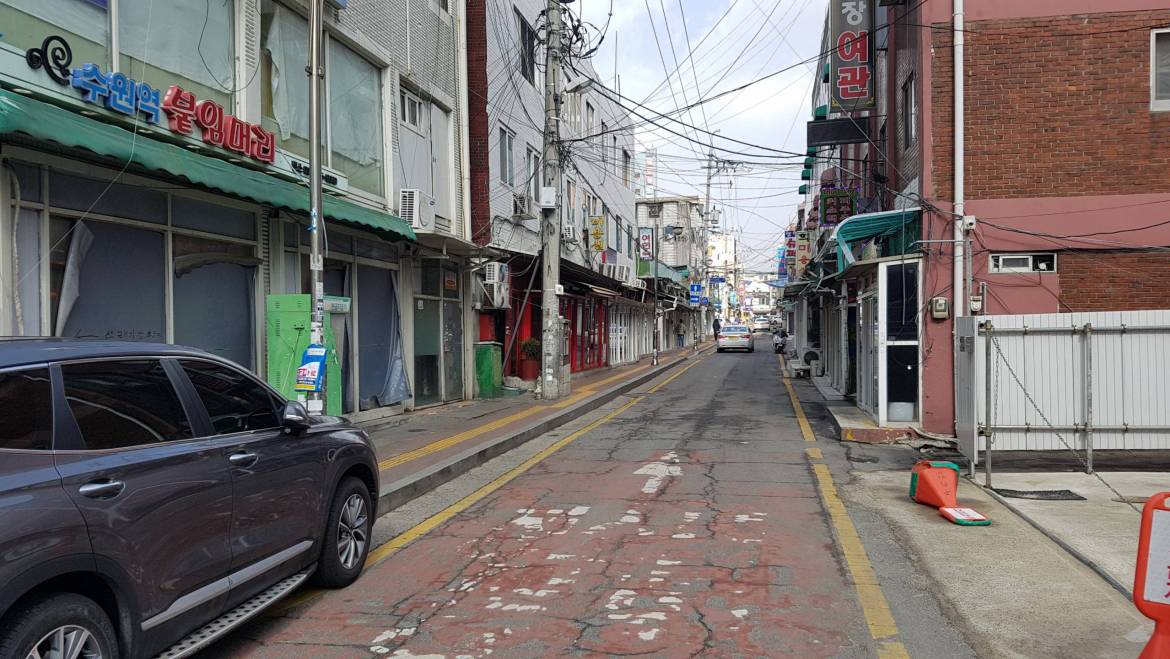‘
‘Why do people hate us?’: Sex workers in Seoul’s last red-light district fret over future
By Chang May Choon (South Korea Correspondent - The Straits Times)
South Korea
Sunday, 09 Jul 2023
12:54 PM MYT
 Capital Alley, the little-known last surviving red-light district in Seoul, is set to be demolished in 2025. - ST PHOTO: CHANG MAY CHOON
Capital Alley, the little-known last surviving red-light district in Seoul, is set to be demolished in 2025. - ST PHOTO: CHANG MAY CHOON
SEOUL: Located a stone’s throw away from the flashy Times Square mall are two rows of glass doors with faded red shades.
All is quiet in the day, with curtains drawn and nary a soul out in the street.
But when night falls, red lights turn on and skimpily dressed women open curtains to beckon the men and cars passing by.
When a deal is struck – the going rate is 100,000 won (S$104) for 15 minutes – the woman and her client disappear behind drawn curtains while her pimp stands guard opposite her so-called “glass house”.
Welcome to Capital Alley, the little-known last surviving red-light district in Seoul that is set to be demolished in 2025, when the area undergoes redevelopment.
The Straits Times spotted 13 working girls there on a Wednesday evening in June.
“Everyone here is worried about our future,” said the only one willing to speak briefly to ST.
Clad in a short dress accentuating her long legs and with heavy make-up over her doe eyes and pouty lips, she reminds one of South Korean actress Yoo In-na.
“If red-light districts keep getting removed, the people working there will have no choice but to retreat into the dark (to continue working),” she added. “We don’t even earn a lot of money from this; why do people hate us?”
Prostitution is illegal but tolerated in South Korea. The country passed an anti-prostitution law in 1961, then enacted a Bill in 2004 to ban commercial sex acts and protect victims.
 Noodle restaurant Myeongdong Kalguksu is located in the middle of Capital Alley. - ST PHOTO: CHANG MAY CHOON
Noodle restaurant Myeongdong Kalguksu is located in the middle of Capital Alley. - ST PHOTO: CHANG MAY CHOON
In the years that followed, the local authorities moved to clamp down on prostitution and eradicate brothels, including 156 in the once-thriving Cheongnyangni 588 in north-eastern Seoul.
As at 2021, however, there were still 15 red-light districts in the country – down from 35 two decades ago, according to government data.
Records showed there were about 900 women working in these areas, although actual numbers were believed to be higher.
Experts say prostitution remains a controversial topic, and removing brothels does not stamp out prostitution itself.
The police have conducted numerous raids nationwide but the sex industry continues to thrive underground in places such as room salons (bars with private rooms for hostesses to entertain customers), kissing rooms (where men pay for kisses and more), massage parlours (which offer extra services) and even ear-cleaning rooms (a false front for sex).
Capital Alley, in the south-western Yeongdeungpo district, is known to host some 146 prostitutes.
ST understands that most are in their 40s and 50s, and some moved over from shuttered brothels in other areas.
They operate from 8pm until the next morning, with 9pm to 10pm being the peak hour.
When hungry, some would patronise the nearby noodle restaurant Myeongdong Kalguksu.
Ms Lee Ok-ran, who owns the five-year-old eatery, said she used to be biased against the women, but has since learnt to accept their presence.
“Some people consider the ladies as social evils, but in a way, they are also a necessary presence,” she said.
“As long as they sincerely do their best and live a life of not harming others, they should be given the opportunity to live among us.
“As for those who come here to relieve their sexual desires, it’s better than them committing crimes or suppressing themselves.”
According to Ms Lee, 65, the women serve not only South Korean residents, but also foreigners who would show up on weekends.
While the area is off-limits to minors below 19, she has seen teenage boys showing up to ogle the women.
“Once, there were these boys who didn’t have enough money to pay for (sex) individually. They didn’t realise it would be so expensive,” she recalled.
“So they huddled together and decided to pool their resources and give it to one representative to approach their chosen girl.”
Throughout the Covid-19 pandemic, some of the glass doors remained open, said Ms Lee. She added that the women operated intermittently depending on the situation.
“Unlike in the past, where some girls were forced to sell their bodies, there is no more compulsion these days. The girls come here voluntarily; no one forces them,” she said.
 A group of former sex workers attending a meditation class run by Seoul city as part of efforts to help the women leave the sex trade. - PHOTO: SEOUL METROPOLITAN GOVERNMENT
A group of former sex workers attending a meditation class run by Seoul city as part of efforts to help the women leave the sex trade. - PHOTO: SEOUL METROPOLITAN GOVERNMENT
Asked if it is awkward to run a restaurant in the middle of the red-light district, Ms Lee said she set up shop five years ago as she was drawn by the location.
During the day, when the glass houses are closed, her outlet attracts a sizeable crowd of office workers, shoppers and residents, she added.
While she will have to move out once redevelopment plans are confirmed, she is supportive of the idea as she believes it will modernise the area.
“They say this area will be turned into a park and there will be a 60-storey building,” she said.
Local reports said the Yeongdeungpo red-light district was particularly resistant to redevelopment due to differences of opinion over future plans.
But things are “sailing smoothly” now, according to the Yeongdeungpo district office.
A representative from its housing renewal division told ST that the intention is to overhaul the old buildings and “transform the area into business and commercial districts and create a clean, urban environment”.
Seoul city, meanwhile, is working to help sex workers find an alternative source of income.
A spokesman for its gender equality division said 10.1 billion won a year is set aside to fund programmes to help the “victims get back on their feet”.
The city runs shelters and counselling centres and provides medical and legal assistance, as well as job training.
Those who decide to leave their past behind can receive up to 7.6 million won worth of support each, such as treatment for job-related illnesses and psychological therapy.
“We also run social integration programmes that will encourage them to return to society and become more self-sufficient,” the spokesman said.
Seoul has also stepped up efforts to clamp down on the sex trade on the sly, such as in bars, massage parlours and websites.
The city is also relying on civic groups and citizens to report prostitution.
An online monitoring team comprising 1,000 citizens, for example, has since 2021 reported 244,667 cases found on social media, websites, mobile-phone chat groups and more.
Seoul officials also run programmes to raise public awareness against prostitution, as not everyone is aware of its illegality.
A 2019 survey by the Ministry of Gender Equality and Family showed that 88.5 per cent of respondents knew that the sex trade is banned.
Activists, however, feel that more government support is needed to get the women out of the sex trade and punish those who benefit, such as pimps and landlords who rent spaces to host the glass houses.
They also warn that demolishing red-light districts will only push the women into other areas or other forms of prostitution, without addressing the root of the issue. - The Straits Times/ANN
Source: https://www.thestar.com.my/aseanplus/aseanp...ret-over-future
‘Why do people hate us?’: Sex workers in Seoul’s last red-light district fret over future
By Chang May Choon (South Korea Correspondent - The Straits Times)
South Korea
Sunday, 09 Jul 2023
12:54 PM MYT

SEOUL: Located a stone’s throw away from the flashy Times Square mall are two rows of glass doors with faded red shades.
All is quiet in the day, with curtains drawn and nary a soul out in the street.
But when night falls, red lights turn on and skimpily dressed women open curtains to beckon the men and cars passing by.
When a deal is struck – the going rate is 100,000 won (S$104) for 15 minutes – the woman and her client disappear behind drawn curtains while her pimp stands guard opposite her so-called “glass house”.
Welcome to Capital Alley, the little-known last surviving red-light district in Seoul that is set to be demolished in 2025, when the area undergoes redevelopment.
The Straits Times spotted 13 working girls there on a Wednesday evening in June.
“Everyone here is worried about our future,” said the only one willing to speak briefly to ST.
Clad in a short dress accentuating her long legs and with heavy make-up over her doe eyes and pouty lips, she reminds one of South Korean actress Yoo In-na.
“If red-light districts keep getting removed, the people working there will have no choice but to retreat into the dark (to continue working),” she added. “We don’t even earn a lot of money from this; why do people hate us?”
Prostitution is illegal but tolerated in South Korea. The country passed an anti-prostitution law in 1961, then enacted a Bill in 2004 to ban commercial sex acts and protect victims.

In the years that followed, the local authorities moved to clamp down on prostitution and eradicate brothels, including 156 in the once-thriving Cheongnyangni 588 in north-eastern Seoul.
As at 2021, however, there were still 15 red-light districts in the country – down from 35 two decades ago, according to government data.
Records showed there were about 900 women working in these areas, although actual numbers were believed to be higher.
Experts say prostitution remains a controversial topic, and removing brothels does not stamp out prostitution itself.
The police have conducted numerous raids nationwide but the sex industry continues to thrive underground in places such as room salons (bars with private rooms for hostesses to entertain customers), kissing rooms (where men pay for kisses and more), massage parlours (which offer extra services) and even ear-cleaning rooms (a false front for sex).
Capital Alley, in the south-western Yeongdeungpo district, is known to host some 146 prostitutes.
ST understands that most are in their 40s and 50s, and some moved over from shuttered brothels in other areas.
They operate from 8pm until the next morning, with 9pm to 10pm being the peak hour.
When hungry, some would patronise the nearby noodle restaurant Myeongdong Kalguksu.
Ms Lee Ok-ran, who owns the five-year-old eatery, said she used to be biased against the women, but has since learnt to accept their presence.
“Some people consider the ladies as social evils, but in a way, they are also a necessary presence,” she said.
“As long as they sincerely do their best and live a life of not harming others, they should be given the opportunity to live among us.
“As for those who come here to relieve their sexual desires, it’s better than them committing crimes or suppressing themselves.”
According to Ms Lee, 65, the women serve not only South Korean residents, but also foreigners who would show up on weekends.
While the area is off-limits to minors below 19, she has seen teenage boys showing up to ogle the women.
“Once, there were these boys who didn’t have enough money to pay for (sex) individually. They didn’t realise it would be so expensive,” she recalled.
“So they huddled together and decided to pool their resources and give it to one representative to approach their chosen girl.”
Throughout the Covid-19 pandemic, some of the glass doors remained open, said Ms Lee. She added that the women operated intermittently depending on the situation.
“Unlike in the past, where some girls were forced to sell their bodies, there is no more compulsion these days. The girls come here voluntarily; no one forces them,” she said.

Asked if it is awkward to run a restaurant in the middle of the red-light district, Ms Lee said she set up shop five years ago as she was drawn by the location.
During the day, when the glass houses are closed, her outlet attracts a sizeable crowd of office workers, shoppers and residents, she added.
While she will have to move out once redevelopment plans are confirmed, she is supportive of the idea as she believes it will modernise the area.
“They say this area will be turned into a park and there will be a 60-storey building,” she said.
Local reports said the Yeongdeungpo red-light district was particularly resistant to redevelopment due to differences of opinion over future plans.
But things are “sailing smoothly” now, according to the Yeongdeungpo district office.
A representative from its housing renewal division told ST that the intention is to overhaul the old buildings and “transform the area into business and commercial districts and create a clean, urban environment”.
Seoul city, meanwhile, is working to help sex workers find an alternative source of income.
A spokesman for its gender equality division said 10.1 billion won a year is set aside to fund programmes to help the “victims get back on their feet”.
The city runs shelters and counselling centres and provides medical and legal assistance, as well as job training.
Those who decide to leave their past behind can receive up to 7.6 million won worth of support each, such as treatment for job-related illnesses and psychological therapy.
“We also run social integration programmes that will encourage them to return to society and become more self-sufficient,” the spokesman said.
Seoul has also stepped up efforts to clamp down on the sex trade on the sly, such as in bars, massage parlours and websites.
The city is also relying on civic groups and citizens to report prostitution.
An online monitoring team comprising 1,000 citizens, for example, has since 2021 reported 244,667 cases found on social media, websites, mobile-phone chat groups and more.
Seoul officials also run programmes to raise public awareness against prostitution, as not everyone is aware of its illegality.
A 2019 survey by the Ministry of Gender Equality and Family showed that 88.5 per cent of respondents knew that the sex trade is banned.
Activists, however, feel that more government support is needed to get the women out of the sex trade and punish those who benefit, such as pimps and landlords who rent spaces to host the glass houses.
They also warn that demolishing red-light districts will only push the women into other areas or other forms of prostitution, without addressing the root of the issue. - The Straits Times/ANN
Source: https://www.thestar.com.my/aseanplus/aseanp...ret-over-future

